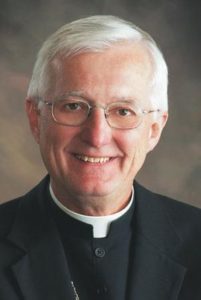Dear Brothers and Sisters in Christ,
Pope Pius XII once wrote that “the liturgical year is neither a series of ideas nor a sequence of festivals that are of greater or lesser importance, but a Person, Christ himself, who is ever living in his Church.”

With the start of Advent, we usher in a new liturgical year, a new opportunity to encounter Christ in the unfolding of time. This year, marked by an extraordinary Jubilee, we come face to face with Christ who reveals the Father of mercy. During this Holy Year we are “called to gaze even more attentively on mercy so that we may become a more effective sign of the Father’s action in our lives” (Misericordia vultus, 3). As Pope Francis has reminded us:
We need constantly to contemplate the mystery of mercy. It is a wellspring of joy, serenity, and peace. Our salvation depends on it. Mercy: the word reveals the very mystery of the Most Holy Trinity. Mercy: the ultimate and supreme act by which God comes to meet us. Mercy: the fundamental law that dwells in the heart of every person who looks sincerely into the eyes of his brothers and sisters on the path of life. Mercy: the bridge that connects God and man, opening our hearts to the hope of being loved forever despite our sinfulness. (Misericordia vultus, 2)
During this liturgical year, the Gospel readings for Sunday Mass (for the most part) are taken from the Gospel according to St. Luke. Perhaps it is no coincidence that the Gospel which presents Jesus as particularly compassionate is being read during this Year of Mercy. Unique to this Gospel, we will meet — and be challenged by — the Good Samaritan, the prodigal’s father, Zacchaeus and the repentant thief, among others.
As this Year of Mercy begins, my heart is drawn to the plight of refugees around the world, especially those fleeing the violence in Syria, Afghanistan and other parts of the Middle East. Countless men, women, and children continue to risk everything in order to find what their right is as human beings: a safe place to call home, to build their families, to contribute to society. We do them, and ourselves, a great injustice by equating a country of origin or religious faith with terrorism, by treating these refugees — who are fleeing terror themselves — as scapegoats. We cannot blame the atrocities that have occurred in Beirut, in Paris and in the skies over Egypt on all Syrians or on all Muslims. Rather, we are called to respond to their plight not with fear or violence, but with mercy. We are called to welcome them in the spirit of St. Benedict, who taught in his Rule for monks: “Let all guests arriving at the monastery be received as Christ Himself, for He will one day say, ‘I was a stranger and you took me in.’”
In this season of hopeful expectation, might we commit to helping keep hope alive for these, our brothers and sisters, who seek safety and shelter? As we gather as families this Christmas, might we also keep in mind and in our prayers those countless families who have no place to lay their heads, and especially those who have lost loved ones to the violence of war and the dangers of travel?
May we be the face of the living and merciful Christ to those who knock on the doors of our hearts, our homes, our parishes and our nation. May we be for them and for all those we will encounter during this Jubilee Year a source of joy, serenity and peace.
Adviento es una oportunidad para encontrar a Cristo
Queridos Hermanos y Hermanas en Cristo,
El Papa Pio XII escribió: “El año litúrgico no es una serie de ideas o una secuencia de fiestas que son de mayor o menor importancia, sino una Persona, Cristo mismo, quien está siempre viviendo en la Iglesia.”
Con el inicio del Adviento, empezamos un nuevo año litúrgico, una nueva oportunidad para encontrar a Cristo en el desarrollo del tiempo. Este año, marcado por un extraordinario Jubileo, nos encontramos cara a cara con Cristo, quien revela al Padre de la Misericordia. Durante este Año Santo, nosotros estamos “llamados a tener la mirada fija en la misericordia para poder ser también nosotros mismos signo eficaz del obrar del Padre” (Misericordiae Vultus, 3- “El rostro de la misericordia”). Como el Papa Francisco nos ha recordado:
Siempre tenemos necesidad de contemplar el misterio de la misericordia. Es fuente de alegría, de serenidad y de paz. Es condición para nuestra salvación. Misericordia: es la palabra que revela el misterio de la Santísima Trinidad. Misericordia: es el acto último y supremo con el cual Dios viene a nuestro encuentro. Misericordia: es la ley fundamental que habita en el corazón de cada persona cuando mira con ojos sinceros al hermano que encuentra en el camino de la vida. Misericordia: es la vía que une Dios y el hombre, porque abre el corazón a la esperanza de ser amados no obstante el límite de nuestro pecado. (Misericordiae Vultus, 2).
Durante este año litúrgico, las lecturas del Evangelio de las Misas del Domingo (la mayor parte) son tomadas del Evangelio de San Lucas. Quizás no es casualidad que el Evangelio que presenta a Jesús como particularmente compasivo, se esté leyendo en este Año de la Misericordia. Lo particular de este Evangelio es que nos encontraremos –y seremos retados- el Buen Samaritano, el Padre Prodigo, Zaqueo y el ladrón arrepentido, entre otros.
Al comenzar el Año de la Misericordia, mi corazón se encuentra con la difícil situación de todos los refugiados de todo el mundo, especialmente de aquellos que huyen de la violencia en Siria, Afganistán y otras partes del Medio Este. Incontables hombres, mujeres y niños que continúan arriesgando todo para encontrar lo que es su derecho como seres humanos: un lugar seguro al cual puedan llamar casa, para formar sus familias, para contribuir a la sociedad. Nosotros les hacemos, y nos hacemos, una gran injusticia al equipar su país de origen y su fe religiosa con el terrorismo, tratando a estos refugiados –quienes huyen ellos mismos del terror- como chivos expiatorios. No podemos culpar de las atrocidades que han ocurrido en Beirut, en Paris y en los cielos de Egipto a todos los sirios o a todos los musulmanes. Más bien, estamos llamados a responder a su difícil situación no con miedo o con violencia, sino con misericordia. Estamos llamados a darles la bienvenida en el espíritu de San Benito, quien enseño en su Reglas para los monjes: “Recibamos a todos los huéspedes que lleguen al monasterio como si recibiéramos al mismo Cristo, porque él va a decir un día: ‘fui forastero y tú me acogiste.’”
En este tiempo de una esperanza expectante, ¿podríamos nosotros ayudar a mantener la esperanza viva para aquellos, nuestros hermanos y hermanas, quienes buscan seguridad y refugio? Al reunirnos como familias esta Navidad, ¿podríamos nosotros también mantener en mente y en nuestras oraciones a todas aquellas incontables familias que no tienen un lugar para recostar la cabeza y, especialmente aquellos que han perdido personas amadas por la violencia de la guerra y en el peligro de los viajes?
¡Qué podamos ser el rostro vivo y misericordioso de Cristo por aquellos que tocaron en la puerta de nuestros corazones, nuestras casas, nuestras parroquias y nuestra nación! ¡Qué seamos para ellos y para todos aquellos que encontraremos durante este Año Jubilar una fuente de alegría, serenidad y paz!
Sincerely in Christ,/Sinceramente en Cristo,
Most Rev. Martin Amos/Mons. Martin Amos
Bishop of Davenport/Obispo de Davenport











